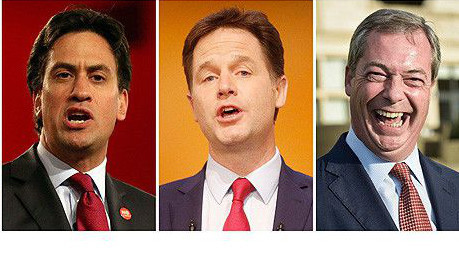
The leaders of Labour, Ukip and the Liberal Democrats have resigned following General Election defeat.
Ed Miliband has quit as Labour leader after a dramatic election night where his party was virtually wiped out in Scotland and David Cameron was on the way to a Commons majority.
Reflecting on the devastating results after 30 seconds of applause, Mr Miliband said he took “absolute and total responsibility” for the result, offering apologies to big Labour beasts including Ed Balls and Jim Murphy who were defeated overnight.
He added: “Britain needs a strong Labour Party, Britain needs a Labour Party that can rebuild after this debate so we can have a government that stands up for working people again.
“And now it is time for someone else to take forward the leadership of this party. So I am tendering my resignation, taking effect after this afternoon’s commemoration of VE Day at the Cenotaph.
“I want to do so straight away because the party needs to have an open and honest debate about the right way forward, without constraint.”
Rather than breaking through as forecast by opinion polls, Labour saw losses to the Tories in key marginal seats and failed to win the Conservatives most vulnerable constituencies.
Nick Clegg has also made a similar announcement.
Resignation as Liberal Democrat leader completes the political price Nick Clegg paid for entering an historic coalition five years ago.
As party leader and Deputy Prime Minister, he said he was putting country before party to ensure Britain had a stable administration capable of dealing with the aftermath of the financial crisis.
Mr Clegg led his party into government and into the cabinet room but abandoning Liberal Democrat promises on tuition fees was seen as a betrayal voters could not forgive.
Mr Clegg apologised repeatedly for abandoning the promise, including in a famous YouTube video that was immediately spoofed and set to music.
But the National Union of Students targeted Mr Clegg, and other Liberal Democrats, with a hard-hitting poster campaign branding them liars.
Although he won Sheffield Hallam with a reduced majority today his resignation appears to conclude a front line political career that began in the European Parliament in 1999.
Mr Clegg first won the seat at the 2005 general election, swiftly becoming his party’s home affairs spokesman under Sir Menzies Campbell.
He won the leadership in 2007, beating off a challenge from Chris Huhne – who was later to resign from the Commons in disgrace.
In government, he led the charge for dramatic increases in the personal income tax allowance and working closely with David Laws at the Department for Education he oversaw the implementation of a pupil premium and free school meals for all infant school pupils.
The Liberal Democrats secured a referendum on changing the voting system to alternative vote only to see it lost.
And Mr Clegg was forced to abandon plans to democratise the House of Lords after a deal with the Tory wing of the coalition on wider reforms fell apart.
Nigel Farage became another party leader casualty when he announced that he would be resigning as leader and taking a summer break.
After promising he would step aside if he did not win his target seat in this election, Mr Farage bowed out saying: “I am a man of my word.”
However, the straight-talking leader did not fully shut the door on his career at the head of his party, saying he could possibly challenge for the top job after the summer.
Mr Farage was the driving force behind Ukip’s surge following the 2014 European elections, steam-rolling his way to the front and centre of public consciousness with his staunchly politically incorrect stance on everything from immigration to breastfeeding
Despite constantly having to fight off accusations of racism and deal with innumerable racist, sexist, and homophobic Ukip candidates, Mr Farage’s party remained third in the opinion polls going into polling night.
He has seemed at times to hold the party together by sheer force of personality, but that personality was not enough to persuade Kent voters to put him in Parliament.

Enjoy the convenience of having The Sunday Post delivered as a digital ePaper straight to your smartphone, tablet or computer.
Subscribe for only £5.49 a month and enjoy all the benefits of the printed paper as a digital replica.
Subscribe